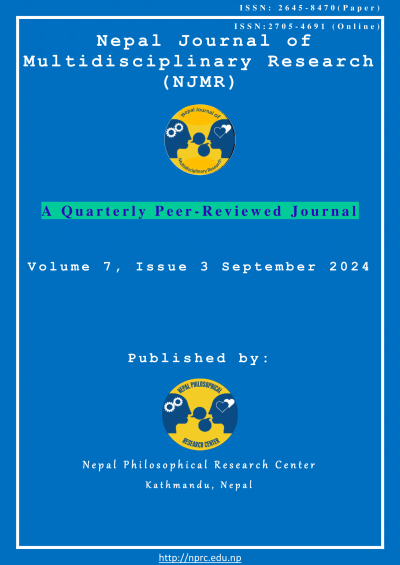Indirect Cost Burden as an Emerging Issue of Foreign Employment in Developing Nations
DOI:
https://doi.org/10.3126/njmr.v7i3.70867Keywords:
Foreign employment, indirect cost, employment agency, government regulation, Free Visa, Free ticketAbstract
Background: The current migration patterns and shifts present significant challenges, including widespread human rights abuses, exploitation of migrant laborers, high indirect costs due to expensive travel, limited affordable credit options, scarce job opportunities for low-skilled workers, and inadequate domestic migration policies. This study aims to identify the additional financial burdens faced by Nepalese migrant workers in Gulf countries.
Methodology: A qualitative research design was used, with purposive sampling to select participants who had migrated to Gulf countries. In-depth interviews with 55 migrant laborers were conducted to gather data on cost burdens and employment conditions.
Findings: Results showed that the indirect cost burden increased significantly after 2015 due to extended processing periods and technical procedures. Respondents generally preferred regulations before 2015. Despite legal changes like the "Free Visa: Free Ticket" policy reducing direct expenses, intermediaries and other indirect costs have offset this reduction, increasing the financial burden on migrant workers.
Conclusion: The study provides valuable insights into Nepal's foreign employment complexities, urging more research and measures for migrant worker well-being. Findings reveal intermediaries exploiting workers by altering passport photos or obtaining counterfeit birth certificates. Additionally, 2% of surveyed workers migrated as young returnees before age 18. These insights are essential to empower recruitment agencies and improve their practices, ensuring safer, prompt, and more productive labor migration.
Novelty: This study uncovers the hidden financial burdens Nepalese migrant workers face in Gulf countries. It highlights the offsetting effect of intermediaries on legal reforms like the "Free Visa: Free Ticket" policy. It offers new insights into labor exploitation and emphasizes better regulation and worker protection.
Downloads
Downloads
Published
How to Cite
Issue
Section
License
Copyright (c) 2024 The Author(s)

This work is licensed under a Creative Commons Attribution-NonCommercial 4.0 International License.
This license enables reusers to distribute, remix, adapt, and build upon the material in any medium or format for noncommercial purposes only, and only so long as attribution is given to the creator.




